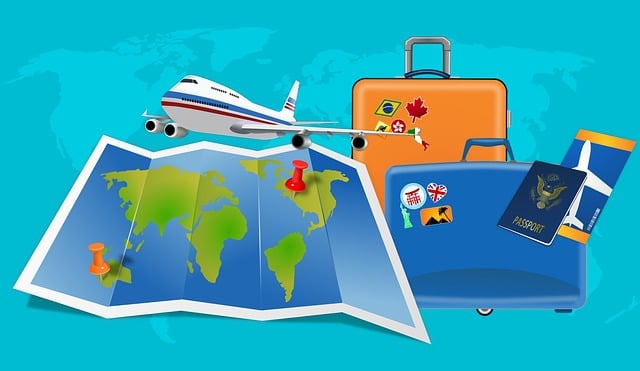Unveiling the Scope of the Travel and Tourism Industry: A Global Perspective

How to Build a Successful Career in Travel and Tourism Industry
19 July 2023
Career In Cultural Tourism 2023 – Job Profile, Salary & Courses
1 August 2023The scope of the travel and tourism industry is vast and ever-evolving. It encompasses a wide range of activities, services, and destinations that cater to the diverse needs and preferences of travelers. From leisure tourism and adventure travel to business trips and educational excursions, the industry offers something for everyone. It includes transportation services such as airlines, trains, and cruises, as well as accommodation options like hotels, resorts, and vacation rentals. Attractions and entertainment venues, such as museums, theme parks, and cultural sites, also fall within its scope. Additionally, travel agencies, tour operators, and online booking platforms globalization, the scope of the travel and tourism industry continues to expand, contribute to the industry’s extensive reach. With increasing connectivity and embracing emerging trends such as sustainable tourism, experiential travel, and digital innovations. As an essential catalyst for economic growth, job creation, and cultural enrichment, this industry holds immense potential for both individuals and societies, fostering understanding, appreciation, and exploration of our diverse world.

Let’s explore the scope of the travel and tourism industry from a global perspective:
1. International Travel:
The industry facilitates international travel, enabling people to explore different countries and cultures. International tourism involves activities such as leisure vacations, business travel, educational trips, and visiting friends and relatives. It contributes to cross-cultural understanding, global cooperation, and exchange of ideas.
2. Domestic Tourism:
Domestic tourism refers to travel within one’s own country. It includes activities such as visiting tourist attractions, national parks, heritage sites, and participating in local events and festivals. Domestic tourism promotes regional development, supports local businesses, and encourages the preservation of cultural and natural heritage.
3. Economic Impact:
The travel and tourism industry is a major economic driver worldwide. It generates revenue through various sectors, including transportation, accommodation, food and beverage services, entertainment, and attractions. The industry creates jobs directly and indirectly, supporting diverse sectors such as aviation, hotel management, tour operations, and more.
4. Hospitality and Accommodation:
The hospitality sector is a vital component of the travel and tourism industry, playing an essential role in providing services and amenities to travelers. It includes a range of establishments such as hotels, resorts, guesthouses, bed and breakfasts, and homestays. These accommodations offer lodging facilities, dining options, and additional amenities to meet the diverse needs and preferences of travelers.
5. Transportation:
Transportation is an integral component of the travel and tourism industry. It includes air travel, road transport, railways, cruises, and other modes of transportation. Airlines, airports, car rental companies, and public transportation systems contribute to the seamless movement of
tourists within and between destinations.
6. Sustainable Tourism:
The concept of sustainable tourism has gained prominence in recent years. It focuses on minimizing negative impacts on the environment, culture, and society while maximizing the benefits of tourism. Sustainable practices include promoting responsible travel, conserving natural resources, supporting local communities, and raising awareness about environmental issues.
7. Travel Agencies and Tour Operators:
Travel agencies and tour operators facilitate trip planning, booking, and coordination of travel services. They provide assistance in selecting destinations, organizing itineraries, arranging transportation, accommodations, and tours. These intermediaries play a vital role in promoting tourism and offering customized experiences to travelers.
8. Government Initiatives and Policies:
Governments across the world recognize the importance of the travel and tourism industry and implement policies to promote its growth. They invest in infrastructure development, marketing campaigns, visa facilitation, and safety regulations to attract tourists and create a conducive environment for the industry.
9. Challenges and Opportunities:
The travel and tourism industry faces various challenges, including geopolitical uncertainties, natural disasters, public health crises, and changing consumer preferences. However, it also presents numerous opportunities for innovation, collaboration, and sustainable development. Emerging trends such as ecotourism, adventure tourism, wellness travel, and digital nomadism are reshaping the industry’s landscape.
10. Technological advancements:
Technological advancements have had a transformative impact on the travel and tourism industry. The introduction of online booking platforms, mobile applications, virtual reality experiences, and digital marketing strategies has revolutionized the way travelers plan and enjoy their trips. These technological innovations have provided convenience and efficiency to both businesses and travelers alike. Furthermore, ongoing technological advancements are expected to further shape the future of the industry. In conclusion, the travel and tourism industry holds immense global significance with its wide-ranging scope. It encompasses diverse activities, including international and domestic travel, hospitality services, transportation, and more. The industry plays a substantial role in driving economies, fostering cultural exchange, and contributing to the overall well-being of societies around the world.







1 Comment
I have been examinating out a few of your stories and it’s pretty good stuff. I will surely bookmark your blog.